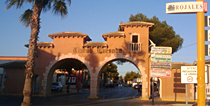Join Talk Quesada


 Welcome to Talk Quesada! My name's Alex and this is my website all about Ciudad Quesada in Spain. Talk Quesada is free to sign up and use so register below!
Welcome to Talk Quesada! My name's Alex and this is my website all about Ciudad Quesada in Spain. Talk Quesada is free to sign up and use so register below!
New Spanish driving laws 2014.
New Spanish driving laws 2014.
![]() by Jan » Mon May 26, 2014 12:17 am
by Jan » Mon May 26, 2014 12:17 am
Apparently congress in Spain recently passed (on May 9th 2014) a new traffic legislation that affects how motorists and cyclists use Spanish roads.
Certain aspects of the new law will not fully come into force until the current Spanish highway code has been revised in June 2014 as some of the reforms still need to be approved. However, some of the changes to keep in mind when driving or pedalling along Spanish roads are listed below:
1. Helmets mandatory in cities for cyclists under 16. After a long row over safety issues, the Popular Party has backtracked on its intention to make helmets mandatory for all riders within municipal limits. In the end, only minors will have to wear them. Not doing so could lead to fines of 200 euros for parents.
2. Small children may not ride in the front seat. Law enforcement officers will be able to stop and fine drivers carrying children under 1.35 meters in the front passenger seat, unless all the back seats are already taken up by other children also under the height limit (or the car has no back seats at all). Until now, under-12's could ride in the front as long as they had a booster seat or other approved retaining device. Taxis will have to follow the same rules, but parents, not taxi drivers, will be held accountable for violations. Fines can also reach 200 euros.
3. Bigger fines for drunk driving. Driving with double the allowed limit of alcohol in the blood will now mean a fine of 1,000 euros rather than 500. Those caught driving under the influence twice within the same year will get slapped with a 2,000-euro fine the second time round.
4. Fines for driving after taking drugs. The new law eliminates the need to prove that drug use influenced a person’s driving. Now, all it takes is a saliva test: if the result shows the presence of drugs in the body, drivers will be presented with a 1,000-euro fine regardless of whether the substances affected their driving or not. Prescription drugs are excluded.
5. Alcohol and drug tests for pedestrians. Pedestrians caught violating a traffic regulation – by crossing the road at the wrong place, for instance – will be obliged to submit to a drug and alcohol test. Until now, this was only the case if they were involved in an accident.
6. New speed limits. While the current speed limit on highways and freeways is 120km/h, the reforms contemplate raising this to 130km/h. The new code scheduled for approval in June will determine where and when this speed may be legally reached. Penalties will be the same: starting at 100 euros for vehicles going up to 150km/h.
7. No minimum speed restrictions for bicycles. This reform aims to solve a problem faced by cyclists in cities. Until now, vehicles could not travel at a speed below 50 percent of the limit. This was a problem for cyclists in spots such as Madrid’s Cuesta de la Vega, a steep slope where riders have a hard time going faster than 25km/h. Freeways remain off-limits to cyclists.
8. Ban on speed camera detectors and jammers. The new legislation expressly prohibits the use of speed camera detectors: drivers caught using them will be liable to fines of 200 euros and the loss of three points on their license. Speed camera jammers are considered much more serious and entail penalties of 6,000 euros and six points off the permit. Only alert systems offering information about the locations of speed cameras based on databases will be legal. Drivers with GPS devices incorporating speed camera detection capabilities will have to deactivate this option.
9. Foreign residents must register their vehicles. Because foreigners living in Spain were not under the obligation to register their cars here, in practice it was difficult to get them to pay traffic fines or submit to controls. The new regulations will determine the deadlines and conditions for vehicle registration.
10. Road works. It will be considered a serious offence to conduct any kind of road works without first informing the pertinent traffic authorities.
11. Road debris. Dropping items of any kind on the road will carry high penalties because of “the danger it poses to other road users.”
12. Inspecting driving schools. Hindering health department or traffic inspectors trying to carry out checks on driving schools and other vehicle-related centres will be considered an offence.
13. Police can fine vehicles without stopping them. Officers will be able to fine vehicles without hailing them down if they are performing duties that prevent them from doing so or giving chase.
14. Drivers to be responsible in accidents involving game animals. Until now, such accidents were only blamed on drivers if they were in violation of the rules of the road, otherwise the state or the owner of the hunting preserve were held accountable. Under the new law, drivers will always be considered to blame unless it can be proven that the animal stormed the road as a result of a big-game hunt held that day or within 12 hours of one having taken place. The state will only be accountable if it fails to provide proper warning signals or to mend broken fences. In practice what this means is that no compensation will be handed out in the event of a driver being killed or seriously injured after a collision with an animal on one of Spain’s nearly 25,000 hunting preserves.
15. 50 percent discount for early fine payment extended to 20 days. This is up from the current 15 days.
16. Environmental restrictions. Vehicles may be barred from entering certain roadways based on environmental criteria. The Environment Ministry will establish the exact rules governing this point.
17. New reasons for immobilizing vehicles. As well as the vehicles of drivers who let children ride without the proper safety devices, authorities will also be able to immobilize those being driven without the proper permit (a C permit in the case of vehicles weighing between 3,500kg and 7,500kg and a D permit in the case of buses).
18. Ban on taking unsafe vehicles to other countries. This article is an application of the United Nations’ Global Plan for the Decade of Action for Road Safety 2011-2020, which aims to discourage the importing and exporting of new or used vehicles deemed unsafe.
19. Priority for tow trucks. Tow trucks on their way to assist motorists will have right of way and have to be treated the same way as ambulances.
20. Fewer driving restrictions for cancer patients. Right now cancer sufferers are hardly ever allowed to drive, unless their doctor takes it up with the traffic authority. But improved medical treatment is set to be reflected in the new road rules, which will place fewer restrictions on patients.
With credit to the original source article:
http://elpais.com/elpais/2014/03/21/inenglish/1395421359_504010.html
Certain aspects of the new law will not fully come into force until the current Spanish highway code has been revised in June 2014 as some of the reforms still need to be approved. However, some of the changes to keep in mind when driving or pedalling along Spanish roads are listed below:
1. Helmets mandatory in cities for cyclists under 16. After a long row over safety issues, the Popular Party has backtracked on its intention to make helmets mandatory for all riders within municipal limits. In the end, only minors will have to wear them. Not doing so could lead to fines of 200 euros for parents.
2. Small children may not ride in the front seat. Law enforcement officers will be able to stop and fine drivers carrying children under 1.35 meters in the front passenger seat, unless all the back seats are already taken up by other children also under the height limit (or the car has no back seats at all). Until now, under-12's could ride in the front as long as they had a booster seat or other approved retaining device. Taxis will have to follow the same rules, but parents, not taxi drivers, will be held accountable for violations. Fines can also reach 200 euros.
3. Bigger fines for drunk driving. Driving with double the allowed limit of alcohol in the blood will now mean a fine of 1,000 euros rather than 500. Those caught driving under the influence twice within the same year will get slapped with a 2,000-euro fine the second time round.
4. Fines for driving after taking drugs. The new law eliminates the need to prove that drug use influenced a person’s driving. Now, all it takes is a saliva test: if the result shows the presence of drugs in the body, drivers will be presented with a 1,000-euro fine regardless of whether the substances affected their driving or not. Prescription drugs are excluded.
5. Alcohol and drug tests for pedestrians. Pedestrians caught violating a traffic regulation – by crossing the road at the wrong place, for instance – will be obliged to submit to a drug and alcohol test. Until now, this was only the case if they were involved in an accident.
6. New speed limits. While the current speed limit on highways and freeways is 120km/h, the reforms contemplate raising this to 130km/h. The new code scheduled for approval in June will determine where and when this speed may be legally reached. Penalties will be the same: starting at 100 euros for vehicles going up to 150km/h.
7. No minimum speed restrictions for bicycles. This reform aims to solve a problem faced by cyclists in cities. Until now, vehicles could not travel at a speed below 50 percent of the limit. This was a problem for cyclists in spots such as Madrid’s Cuesta de la Vega, a steep slope where riders have a hard time going faster than 25km/h. Freeways remain off-limits to cyclists.
8. Ban on speed camera detectors and jammers. The new legislation expressly prohibits the use of speed camera detectors: drivers caught using them will be liable to fines of 200 euros and the loss of three points on their license. Speed camera jammers are considered much more serious and entail penalties of 6,000 euros and six points off the permit. Only alert systems offering information about the locations of speed cameras based on databases will be legal. Drivers with GPS devices incorporating speed camera detection capabilities will have to deactivate this option.
9. Foreign residents must register their vehicles. Because foreigners living in Spain were not under the obligation to register their cars here, in practice it was difficult to get them to pay traffic fines or submit to controls. The new regulations will determine the deadlines and conditions for vehicle registration.
10. Road works. It will be considered a serious offence to conduct any kind of road works without first informing the pertinent traffic authorities.
11. Road debris. Dropping items of any kind on the road will carry high penalties because of “the danger it poses to other road users.”
12. Inspecting driving schools. Hindering health department or traffic inspectors trying to carry out checks on driving schools and other vehicle-related centres will be considered an offence.
13. Police can fine vehicles without stopping them. Officers will be able to fine vehicles without hailing them down if they are performing duties that prevent them from doing so or giving chase.
14. Drivers to be responsible in accidents involving game animals. Until now, such accidents were only blamed on drivers if they were in violation of the rules of the road, otherwise the state or the owner of the hunting preserve were held accountable. Under the new law, drivers will always be considered to blame unless it can be proven that the animal stormed the road as a result of a big-game hunt held that day or within 12 hours of one having taken place. The state will only be accountable if it fails to provide proper warning signals or to mend broken fences. In practice what this means is that no compensation will be handed out in the event of a driver being killed or seriously injured after a collision with an animal on one of Spain’s nearly 25,000 hunting preserves.
15. 50 percent discount for early fine payment extended to 20 days. This is up from the current 15 days.
16. Environmental restrictions. Vehicles may be barred from entering certain roadways based on environmental criteria. The Environment Ministry will establish the exact rules governing this point.
17. New reasons for immobilizing vehicles. As well as the vehicles of drivers who let children ride without the proper safety devices, authorities will also be able to immobilize those being driven without the proper permit (a C permit in the case of vehicles weighing between 3,500kg and 7,500kg and a D permit in the case of buses).
18. Ban on taking unsafe vehicles to other countries. This article is an application of the United Nations’ Global Plan for the Decade of Action for Road Safety 2011-2020, which aims to discourage the importing and exporting of new or used vehicles deemed unsafe.
19. Priority for tow trucks. Tow trucks on their way to assist motorists will have right of way and have to be treated the same way as ambulances.
20. Fewer driving restrictions for cancer patients. Right now cancer sufferers are hardly ever allowed to drive, unless their doctor takes it up with the traffic authority. But improved medical treatment is set to be reflected in the new road rules, which will place fewer restrictions on patients.
With credit to the original source article:
http://elpais.com/elpais/2014/03/21/inenglish/1395421359_504010.html
Like us on Facebook to keep in touch: Facebook.com/TalkQuesada
-

Jan - Site Admin
- Posts: 11193
- Images: 164
- Joined: Mon Oct 17, 2011 8:34 pm
- Which part of Spain are you from?: Lo Marabu Dona Pepa
- Gender: Female
- scubydoo
- Posts: 3328
- Images: 3
- Joined: Sat Mar 01, 2014 4:10 pm
- Which part of Spain are you from?: Benimar
- Gender: Male
-

EnglishRose - Posts: 192
- Joined: Tue Apr 15, 2014 10:20 pm
- Location: UK
- Which part of Spain are you from?: Quesada
- Gender: Female
3 posts
• Page 1 of 1
Related topics
-
- Similar Topics
- Replies
- Views
- Last post
-
-
driving spanish car in the UK
1, 2, 3, 4, 5 by bass2112 » Mon Jan 22, 2024 9:01 am in Quesada general discussion - 41
- 833
-
by Bee

Sat Feb 10, 2024 1:23 pm
-
driving spanish car in the UK
-
-
Expired Spanish driving licence
by willemite » Mon Nov 06, 2023 12:27 pm in Quesada general discussion - 5
- 301
-
by Ov3rdal3

Tue Nov 07, 2023 9:40 am
-
Expired Spanish driving licence
-
-
Renewing Spanish driving licences.

1, 2, 3 by donniemacd » Fri Aug 11, 2023 12:24 pm in Quesada general discussion - 20
- 635
-
by merida

Wed Aug 16, 2023 8:01 am
-
Renewing Spanish driving licences.
-
-
First time renewal of Spanish driving licence.
1, 2 by lance » Fri Jan 05, 2024 9:34 am in Quesada general discussion - 16
- 458
-
by Andrew Hardy

Sun Jan 07, 2024 12:14 pm
-
First time renewal of Spanish driving licence.
-
-
CCTV laws

by Mac davies » Sun Mar 03, 2024 5:54 pm in Quesada general discussion - 9
- 485
-
by DTR

Tue Mar 05, 2024 10:41 am
-
CCTV laws
Who is online
Users browsing this forum: No registered users and 3 guests
Login
Find in Quesada
Quesada pages
Quesada discussion
 Quesada general discussion
Quesada general discussion Banking and finances
Banking and finances Broadband, Wifi, Phone and TV
Broadband, Wifi, Phone and TV Buses and public transport in and around Quesada
Buses and public transport in and around Quesada Driving to Spain / Car hire in Spain / Buying and owning a car in Spain
Driving to Spain / Car hire in Spain / Buying and owning a car in Spain Fiestas in Quesada
Fiestas in Quesada Flights, baggage and airports
Flights, baggage and airports Health services in Quesada
Health services in Quesada Insurances and wills in Spain
Insurances and wills in Spain Items for sale and wanted in and around Quesada
Items for sale and wanted in and around Quesada Interesting articles about Spain
Interesting articles about Spain Jobs and careers in Quesada
Jobs and careers in Quesada Lost and found in Quesada
Lost and found in Quesada Market days
Market days Places to go for free Wi-Fi
Places to go for free Wi-Fi Recommended restaurants / cafes / bars
Recommended restaurants / cafes / bars Recommended Tradesmen and Companies
Recommended Tradesmen and Companies Residency in Spain: padron, residencia and passport advice
Residency in Spain: padron, residencia and passport advice Safety / security information and property in Spain hints and tips
Safety / security information and property in Spain hints and tips Taxes in Spain: Suma, NIE and general tax advice
Taxes in Spain: Suma, NIE and general tax advice Taxis in Quesada
Taxis in Quesada Things to do and places to go in and around Quesada
Things to do and places to go in and around Quesada Utilities in Spain: Electric, gas and water recommendations and advice
Utilities in Spain: Electric, gas and water recommendations and advice Weather in Quesada
Weather in Quesada Where to buy things in and around Quesada
Where to buy things in and around Quesada Where to hire things in and around Quesada
Where to hire things in and around Quesada
Properties discussion
Businesses and places in Quesada
 Bars and pubs in Quesada
Bars and pubs in Quesada Beaches near Quesada
Beaches near Quesada Beauticians / Beauty salons in Quesada
Beauticians / Beauty salons in Quesada Bedding and soft furnishings shops in Quesada
Bedding and soft furnishings shops in Quesada Butchers in Quesada
Butchers in Quesada Car dealers in Quesada: new and used car dealers
Car dealers in Quesada: new and used car dealers Car garages, mechanics, tyre fitter centres in Quesada
Car garages, mechanics, tyre fitter centres in Quesada Car hire in Quesada
Car hire in Quesada DIY / Bricolage / Ferreteria stores in Quesada
DIY / Bricolage / Ferreteria stores in Quesada Equipment hire centers in Quesada
Equipment hire centers in Quesada Estate agents in Quesada
Estate agents in Quesada Furniture shops in Quesada
Furniture shops in Quesada Garden centres and garden furniture shops in Quesada
Garden centres and garden furniture shops in Quesada Golf Courses in Quesada
Golf Courses in Quesada Grills / gates / metal items shops in Quesada
Grills / gates / metal items shops in Quesada Hairdressers in Quesada
Hairdressers in Quesada Hotels, guest houses and bed and breakfasts in Quesada and nearby
Hotels, guest houses and bed and breakfasts in Quesada and nearby Internet service providers that cover Quesada
Internet service providers that cover Quesada Launderettes / dry cleaners in Quesada
Launderettes / dry cleaners in Quesada Markets in Quesada
Markets in Quesada Medical / Health centers in Quesada
Medical / Health centers in Quesada Pet shops in Quesada
Pet shops in Quesada Pharmacies / Chemist shops in Quesada
Pharmacies / Chemist shops in Quesada Restaurants in Quesada
Restaurants in Quesada Shopping centres in Quesada
Shopping centres in Quesada Sports centres and gyms in Quesada
Sports centres and gyms in Quesada Supermarkets in Quesada
Supermarkets in Quesada Swimming pool services in Quesada
Swimming pool services in Quesada Town Halls (Ayuntamientos) in Quesada
Town Halls (Ayuntamientos) in Quesada Waterparks/Aquaparks in Quesada
Waterparks/Aquaparks in Quesada
- TalkQuesada » Board index
- The team • Delete all board cookies • All times are UTC [ DST ]
- Our other websites:
- Costa Blanca forum
- Costa Calida forum
- Costa del Sol forum
- Costa de Almeria forum
- Costa de la Luz forum
- Costa Dorada forum
- Costa Brava forum
- UK forum
- Jobs in the UK
- Our policies:
- Privacy policy
- User agreement
- Content policy
- Website created and operated by JSM Forum Websites


























 Weather in Quesada
Weather in Quesada Webcams in Quesada
Webcams in Quesada